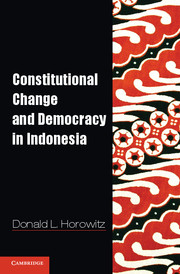Book contents
- Frontmatter
- Contents
- Preface
- Map of Indonesia
- Glossary
- 1 A Distinctive Path
- 2 Democratization Before Renovation
- 3 Creeping Reform
- 4 A Game of Inches
- 5 Anomalies, Ironies, Regularities, and Surprises
- 6 The Shape of the New System
- 7 Low-Quality Democracy and Its Discontents
- 8 Causes, Consequences, and the Consequences of the Consequences
- Index
- References
2 - Democratization Before Renovation
Published online by Cambridge University Press: 05 February 2013
- Frontmatter
- Contents
- Preface
- Map of Indonesia
- Glossary
- 1 A Distinctive Path
- 2 Democratization Before Renovation
- 3 Creeping Reform
- 4 A Game of Inches
- 5 Anomalies, Ironies, Regularities, and Surprises
- 6 The Shape of the New System
- 7 Low-Quality Democracy and Its Discontents
- 8 Causes, Consequences, and the Consequences of the Consequences
- Index
- References
Summary
After the fall of Suharto in May 1998, there was international pressure to democratize the Indonesian regime and a good deal of international influence in the early stages of democratization, although by no means through what could be regarded as conventional channels. For a time, it seemed as if great latitude would be accorded to externally derived prescriptions, but before long the process was given over to domestic politics. As a result, the shape of what ultimately emerged in Indonesia was, in most respects, different from what had been contemplated by participants in the early stages of democratization. In the end, externally derived ideas yielded to internally constructed consensus. But the road to that result was a circuitous one, because Indonesia opted for elections first.
Following the resignation of Suharto, his vice president and successor, B. J. Habibie, appointed a team of academics and civil servants to draft new laws on political parties, elections, governmental structure, and devolution, some of which were later greatly modified by the new-regime legislature. These statutes formed the basis for the elections held in 1999. The new legislature, consisting of members of some (partially reformed) old-regime parties, of former extraparliamentary parties, and of newly formed parties, then embarked on a multiyear process of fundamental constitutional change.
- Type
- Chapter
- Information
- Constitutional Change and Democracy in Indonesia , pp. 30 - 54Publisher: Cambridge University PressPrint publication year: 2013

